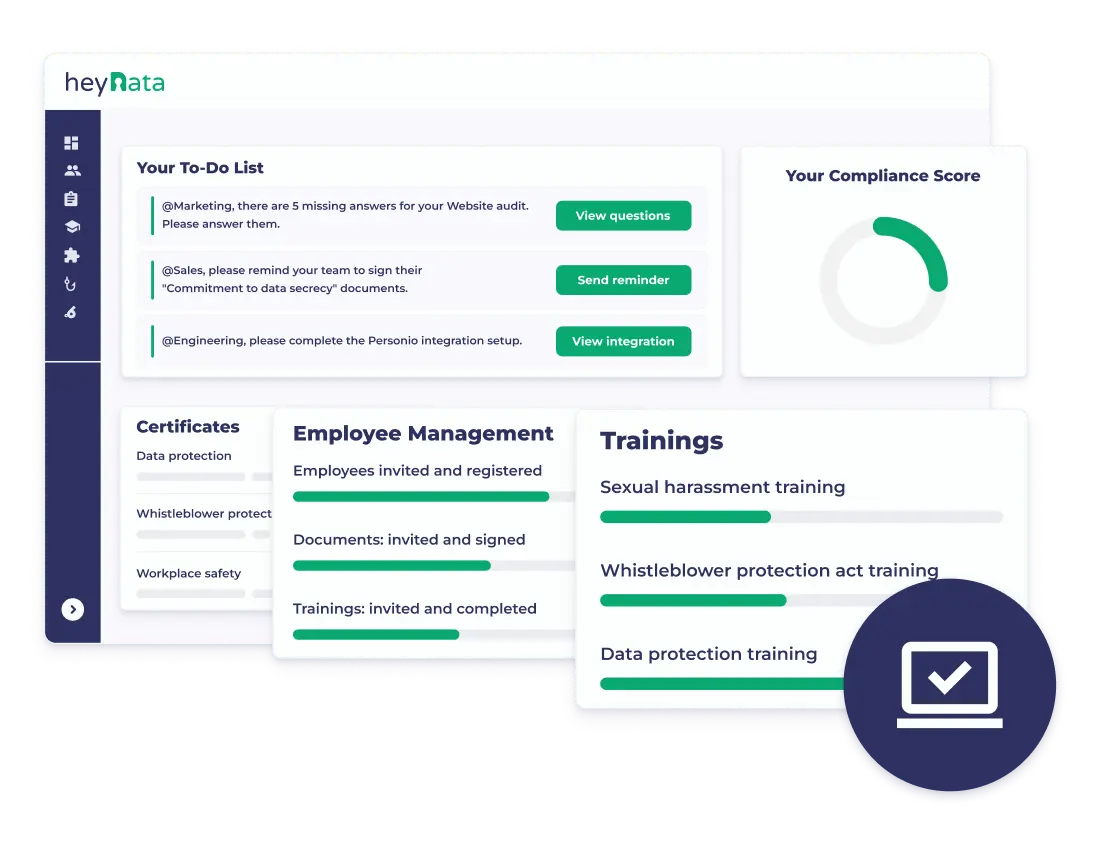Table of contents

What is a Data Protection Impact Assessment (DPIA)?
A data protection impact assessment (DPIA) in accordance with Art. 35 GDPR assesses the effects of processing operations on personal data. Doing so minimizes risks, protects data subjects' rights, and helps to avoid heavy fines.

How Often Should You Conduct a DPIA?
A Data Protection Impact Assessment is not a one-time process. New technologies, changes in data processing or new risks require regular review and updates. This is how you ensure that your data processing always meets the latest requirements and that the rights of those affected are protected. With a continuous DPIA, you stay on the safe side legally and build trust in the long term.
When is a Data Protection Impact Assessment required?
According to Article 35 of the GDPR, a data protection impact assessment is required if the data processing poses a high risk to the rights of the data subjects. The following nine criteria help with the assessment:
Evaluate or classify affected parties
Creating profiles or categorizing people can affect their rights and freedoms, especially if sensitive decisions are based on them.
Automated decision-making
Automated processes such as AI-supported decisions or algorithms carry risks of discrimination or erroneous decisions.
Observation, monitoring or control of data subjects
The surveillance of individuals using cameras, GPS or other technologies can significantly endanger their privacy.
Processing of confidential or particularly personal data
The processing of data such as health, social or financial data requires special care, as a loss of this information can have far-reaching consequences for those affected.
Large-scale data processing
When large amounts of data are processed, the risk of data breaches increases, as does the potential impact on those affected.
Data sets are merged from two or more processing steps
Combining data sources can create new risks, especially when linking sensitive information.
Processing of data of data subjects in need of protection
Groups such as children, employees, or people with special protection needs are particularly vulnerable to data protection violations because they often have less control over their data.
Use of advanced technologies or solutions such as facial recognition, IoT, AI, etc.
Innovative technologies such as facial recognition, IoT or AI bring new data protection risks with them, as their effects are often difficult to predict.
Processing prevents data subjects from exercising rights or fulfilling services/contracts.
If data processing hinders the exercise of rights or access to services, there is a significant risk for those affected.
How to Carry Out a Data Protection Impact Assessment
1
Identification of the Processing Activities
The DPIA begins with the identification of all processing activities that could pose a high risk to the rights and freedoms of natural persons.
2
Assessment of Data Protection Risks
Evaluate the potential risks associated with these processing activities. Our experts will help you identify these risks and assess their consequences.
3
Measures to Minimize Risks
Develop measures to mitigate the identified risks. Our team of experts, consisting of lawyers, will support you in selecting suitable measures.
4
Completion and Documentation
The DPIA results are documented to demonstrate GDPR compliance. Our team ensures that everything is complete and legally compliant.
Who Should Carry Out a Data Protection Impact Assessment?
In your company, if you are responsible for data processing, it is your responsibility as the "data controller". However, you don't have to handle this on your own.
Whether internal or external, a data protection officer is your most important partner when it comes to performing a DPIA accurately and in compliance with the law. An experienced expert can help you overcome any challenge efficiently, securely, and without any headaches.
Advantages of External Support
In-house
Third-party (with heyData)
Expertise
Specialized knowledge or experience is often lacking internally.
With heyData, you have a team of experts at your side that can draw on years of experience in the field of data protection.
Time required
Conducting a DPIA internally ties up valuable resources and extends project times.
By outsourcing to heyData, you save time and can concentrate on your core business.
Legal security
Internal errors or gaps increase the risk of fines and reputational damage.
With heyData, you benefit from maximum compliance security so that you can avoid legal consequences.
Hear it From Our Customers
FAQ
Failure to conduct a required data protection impact assessment can result in significant penalties under the GDPR, including fines of up to €10 million or 2% of the global annual turnover of the previous fiscal year, whichever is greater.
The DPIA usually consists of three main parts:
- A systematic description of the planned data processing operations and the purposes of the processing.
- An assessment of the necessity and proportionality of the processing operations in relation to the purpose.
- An assessment of the risks to the rights and freedoms of data subjects and the mitigation measures, safeguards and mechanisms envisaged to mitigate those risks.
A DPIA is necessary when data processing involves a high risk to the rights and freedoms of data subjects, such as sensitive data. The processing of sensitive data requires a careful assessment of the associated risks and potential impact on privacy to ensure compliance with data protection requirements, such as:
- Comprehensive processing of biometric data to uniquely identify natural persons
- Comprehensive processing of genetic data
- Comprehensive processing of data on the location of data subjects.
The data protection officer plays an essential role in the performance of the DPIA. He or she advises the controller or processor on how to conduct the DPIA, reviews the results, and ensures that the DPIA is conducted in compliance with the GDPR.
Not all companies are obliged to conduct a DPIA. The obligation to conduct a DPIA arises from Article 35 of the GDPR and only concerns processing operations that involve a high risk to the rights and freedoms of natural persons, in particular when using new technologies.
Although it is possible to perform a DPIA yourself, it is often advisable to consult a data protection law expert or a data protection officer due to the complexity of the requirements of the GDPR.
The GDPR provides a set of guidelines for conducting a DPIA. It is important that you familiarize yourself with these guidelines and incorporate them into your DPIA. In addition, consulting with an external data protection expert or data protection officer can help ensure compliance.





